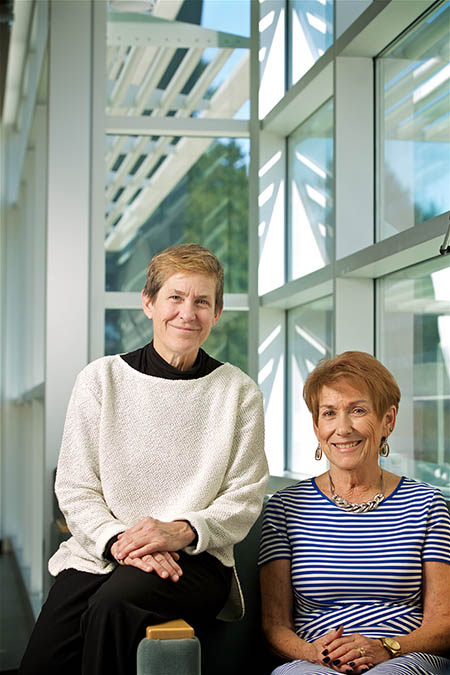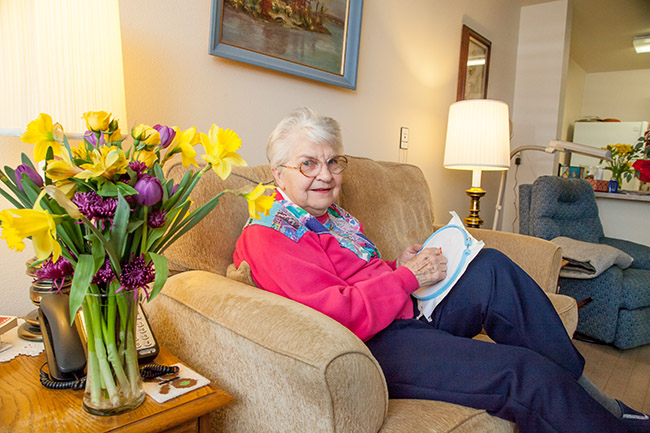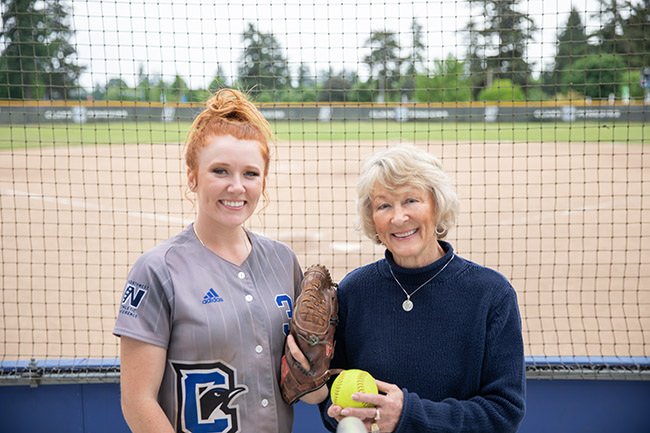Gifts from the heart
More women today are driving their family’s giving by establishing charitable gifts in support of their loved ones, while beginning a legacy at Clark College
By Lily Raff McCaulou
Making charitable gifts can save taxes and establish a family legacy in areas people are passionate about such as education. Still more, such gifts can provide income for people and their children.
“We call that a win-win,” said Vivian Manning, director of development, major gifts and gift planning for Clark College Foundation.
Charitable remainder trusts and charitable gift annuities are two examples of these types of winning solutions offered by Clark College Foundation. In each of the following examples, generous members of Clark College’s community set up life income gifts that benefit their families and the college in unique ways.
Charitable remainder trust
Susan Courtney’s mother, Cleda Mae Churchill, died in 2010, leaving her estate to her two children. Courtney cared for her mother during her last year, so her brother turned his share of the inheritance over to her. Courtney did not need the additional money to support herself.

Clark alumna and donor, Lisa Wright, left, and donor, Susan Courtney, right. Wright is the daughter of Harriet Wilson ’58, former Clark College Foundation board chair, who left an estate gift to Clark upon her death in 2011. Photo by Craig Mitchelldyer ’00
“It took me a long time to decide what to do with it,” said Courtney, 72. “I decided that what would make my mother happy would be to share it with her grandchildren.”
Courtney and her brother each have two grown children. Courtney used the money to set up a charitable remainder trust to support the grandchildren and demonstrate to them how the family enriches the community by giving to Clark College.
In a charitable remainder trust, assets—whether cash, an apartment building or stocks—are transferred into an irrevocable trust and liquidated, free of income taxes. The trust pays a living beneficiary a certain percentage of the total assets each year for a set number of years. Then, the remainder turns over to the charity. The donor receives a sizable deduction at the time of the donation.
In Courtney’s case, each of her mother’s four grandchildren are the beneficiaries and will earn quarterly income on the money for 20 years. After that, the remainder of the trust will fund scholarships for single parents at Clark College.
“My mother was a single parent for many years. I was a single parent for many years,” Courtney said. “And I know that it is hard.”
The quarterly checks to the grandchildren will be “a reminder of… the love that she had for these grandkids, and it just seemed to be the most profound way that her legacy could be carried on,” Courtney added.
Courtney and her husband, Dean Irvin, have made other donations to Clark College too, including funding several scholarships. Courtney said her most personal connection to Clark comes not from her mother, but from her mother-in-law, Stella Mae Irvin. Irvin was married at the age of 16. She had four children and lived in a rural area. Her husband died in his 50s, and Irvin found herself widowed at a relatively young age.
“I took her to Clark,” Courtney said, “to what was at that time called the Displaced Homemakers program (now part of Workforce Education Services). She was welcomed there, she received her GED diploma and she earned an associate degree at Clark. They even employed her for a while. It was one of the highlights of her life.”
Irvin took floral design classes at Clark and started a small florist shop, called “Late Bloomers,” with one of her classmates. Courtney saw how an education from Clark turned Irvin’s life around.
Courtney also found that Clark played a vital for her pursuits. While owning and running two restaurants, Hidden House and Paradise Cafe, she often phoned Clark’s culinary school when she was looking to hire.
“Clark supports us as a community, and as a business owner,” she said.
Learn how to maximize your investments while making a sustained commitment to Clark College. Contact Vivian Manning, CFRE, or Hal Abrams, JD, LL.M, for more about charitable remainder trusts, charitable gift annuities or other types of estate gifts.
Charitable gift annuity
Lois Porch, 92, grew up in Michigan and retired to Texas before moving to Vancouver in 1988, to be closer to her son, Paul Porch. Paul taught math at Mount Hood Community College at the time. When she moved to Vancouver she had already been retired for years, and was eager to learn about genealogy. Her son pointed her toward Clark College, which seemed a fitting place to research her family history.
“My mother grew up in Renton, Wash., and my dad got transferred back east before I was born, but I grew up with a picture of Mt. Rainier over the fireplace,” Porch said.
She enrolled in a course through Clark’s Mature Learning program. However, Porch wasn’t as interested in genealogy as she was in Clark. Porch began volunteering at the college, helping people register for Mature Learning programs over the phone. She found the experience rewarding and the community welcoming.
Porch and her son funded a $100,000 charitable gift annuity through Clark College Foundation. Each donated half of that amount and received a tax deduction. Lois Porch will receive quarterly payments from the fund until her death. After that, Paul Porch will receive payments for his lifetime. Following his death, the remainder will benefit Clark’s STEM programs.
Porch also established several other charitable gift annuities for the college where she is the sole income beneficiary and Clark’s STEM program is the remainder beneficiary upon her death. In recognition for these gifts, the physics lab is named for her son Paul Porch, and her husband, Paul.
“I don’t have any grandkids… So this is kind of our legacy,” she said.

Lois Porch took Mature Learning classes and volunteered at Clark beforebecoming a donor. She has several charitable gift annuities. One annuity provides income for herself, and upon her death, her son, Paul, will receive income from the annuity. Porch is seen here at her Vancouver home in 2015. Photo by Jenny Shadley
Manning, of Clark College Foundation, said that when she first started working in estate gifts 15 years ago, she struggled to bring up the topic of death and legacies. Now she’s comfortable with letting the subject arise on its own while discussing an individual’s personal goals and legacy intensions.
“By the time I’m having this conversation with somebody, we’ve already talked about everything under the sun: Their physical health, education and careers, and first and second husbands,” she said. “And so it’s more about the bigger conversation of: What would you still like to accomplish?”
Manning said that she normally does not bring up annuities unless a donor is nearing age 65. When that conversation does occur, they talk about annuities that pay a fixed percentage rate based on the person’s age at the time it is established. For example, a 65-year-old donor receives a lifetime payment of 5.1 percent; a 75-year-old receives 6.2 percent; and someone aged 90 or older receives 9.5 percent a year for life. Individuals also get an income tax charitable deduction in the initial year of their gift.
“Donors are delighted to learn they can maximize their investment, earn a higher guaranteed payment than holding low-paying certificates of deposit, and empower the lives of Clark students of the future,” Manning explains.
Deferred charitable gift annuity
Sherry Costar never took a course at Clark College, yet she feels a connection to the campus through her mother-in-law, Lois Porch.
“She has always been an amazingly wonderful woman, I’ve looked up to her for 35 years now,” Costar said of Porch.
Porch once invited her son, Paul, and Costar to accompany her to a summer concert at Clark College. Costar remembers sitting at the table where everyone either worked at Clark or donated to Clark.
“Everyone was just so nice; I thought, what a wonderful community,” Costar said.
Costar, 71, was able to retire early from her job as a nurse practitioner and move to Vancouver. Her son, Burl Nolet of Seattle, probably will not have the luxury of an early retirement. Nolet, 43, is currently completing an electrical apprenticeship to begin a new career. Sherry is taking steps to help her son, while contributing to students at Clark.
Costar set up a deferred charitable gift annuity for Nolet as a Christmas gift last year. She put $10,000 in an annuity and received a tax deduction. When Nolet turns 62, he will begin receiving quarterly checks to go toward his retirement. By deferring the date of the first payment for 19 years, Nolet will receive lifetime payments of nearly 10 percent for the rest of his life. After his death, the remaining money will fund scholarships for single parents at Clark College.
“As someone who is changing careers, he (Nolet) can certainly see the value in it,” she said of the Clark scholarship her gift will fund. “He’s… got a lot of catching up to do, so this is a small thing that I can do for him.”
Though Costar never took a course at Clark College, she understands the challenges college students face.
“Back when I was a single mom going through school, I was dependent on Pell Grants and some student loans,” Costar said. “Every little grant that I received really helped.”
Estate Gift
Wilma Raines, 82, grew up in Vancouver “during the war and shipyard days,” she said. She attended Clark College back when it was “just two little row houses out there on Fourth Plain.”
She met her husband, Jim Raines, when she was in third grade and he was in sixth. Jim was the older brother of her good friend, Alice. The couple started dating when Wilma was a student at Clark College. Jim had already transferred from Clark to Lewis and Clark College in Oregon. They married, finished their educations and moved to Seattle. About 25 years ago, they retired and moved back. Immediately, they reconnected with Clark.
The college had changed. There was no longer one little room used as a cafeteria, banquet hall and dance venue.
“Now, I walk around and see these new buildings…there’s the new STEM building, the Nursing program. There are sports teams and a Drama program. Now they’re talking about a new athletic field complex,” Raines said.
Jim Raines was active in bringing baseball back to Clark, fundraising for the new field, fence and bleachers. Each winter, the couple organized and sponsored a basketball clinic for grade school students, taught by Clark College basketball players. The Raines bought pizza for all the participants. The event combined three of the couple’s favorite things: sports, Clark College and the greater Vancouver community.
“We always felt that Vancouver was such a community town and it was just neat to…keep the whole community involved in the college,” Raines said.

Former Clark softball pitcher Hannah Neff, who graduated in 2018, was one of several students Wilma Raines supported through a scholarship. Photo by Jenny Shadley
“The last thing my husband did before he passed away [in 2018] was decide that he wanted a bunch of money to go to field maintenance and community sports,” she said.
The couple had already funded scholarships for student athletes, including one in memory of their daughter, the Jami Raines Shogren Scholarship. Jami was a softball player at Clark who played catcher, like her dad.
Three days before Jim’s death, he was very ill but Wilma helped him get dressed and into his wheelchair to attend a two-hour meeting with Clark’s athletic director.
“The last thing he did with his life was to be at Clark College, which was kind of fitting,” she said. “And it definitely makes me want to help Clark even more. If he could help, he was going to help.”
Wilma Raines made a provision in her living trust to support Clark with more than 50 percent of her estate. She did this in memory of Jim and Jami. The gift will also avoid federal and state inheritance taxes.
“We had one child and I was told we’d never have more,” Raines said. “She passed away about 10 years ago, in her 40s. And so…Clark is our child.”
Charitable remainder trusts, charitable gift annuities and estate gifts are ways in which individuals can set up gifts that benefit themselves, their family and have a lasting effect on the college in profound ways. These are ways of maximizing investments, while establishing a sustained commitment to Clark’s community.
Lily Raff McCaulou is a journalist whose writing has appeared in The New York Times, The Atlantic., The Guardian and Rolling Stone. She lives in Bend, Ore. Visit her online at www.lilyrm.com.



